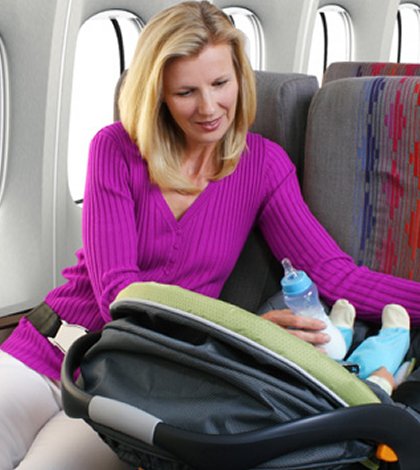Travel, especially international travel, can be stressful enough but for someone with a new infant, taking an international flight can be especially daunting. Not to worry, however. Airlines know that many parents fly with their infants and therefore they do the best they can to accommodate their youngest passengers.
The first hurdle to traveling with an infant is the security check. Although airlines require all carry-on liquids to be in three ounce containers and held entirely in a one quart Ziploc bag, an exception is made for infant formula and breast milk. Parents are allowed to pack as much formula as they can fit in their carry-on luggage, however security check will generally be easier if the formula is divided into containers of three ounces or less. Other parents prefer to pack the formula dry and add water in-flight; just make sure it is pre-measured to avoid messes.
Families with small children are generally given extra time to board the plane, usually after the first and business class passengers but before the general economy class. Your stroller can be taken right up to the entrance of the plane. There you need to fold it and leave it for the crew to pack. It will be waiting for you after you exit the plane. Make sure you fold the stroller properly as the airline is not responsible for any damages caused by their employees folding your stroller for you.
Once you are on the plane, the most distressing part for your infant will most likely be during take-off and landing. The change in cabin pressure can hurt his ears. While an adult has the option of chewing gum, an infant can be best soothed by feeding or sucking on a pacifier during that time. Once the cabin pressure has settled, most infants, especially those under six months old, will be lulled by the noise of the plane’s engines and may sleep through the entire flight. Some airlines will even provide small cribs that fasten to the wall of the plane just above your seat so you don’t have to hold your infant the entire time.
Having an infant awake and crying on a plane is many a parent’s worst nightmare. First, make sure that your baby’s ear pressure has normalized. After that, the usual routine of feeding, burping or changing your baby can alleviate his crying just as it often does at home. If that doesn’t work, the cabin crew is generally understanding of your need to pace up and down the aisle with your infant after the fasten seat belt light has been turned off. If you baby still won’t stop crying, it is not your job to worry about the comfort of the other passengers. You’ve done everything you can, but sometimes babies just cry.
Both feeding and changing your baby can take place in your seat, especially if your baby is little enough. However, as most airplane bathrooms come with changing tables, it may be more polite to use them, especially when the diaper is very dirty. Breast feeding is allowed on planes; request a window seat or use an extra blanket for added privacy. If you have bottled breast milk or formula that needs to be heated up, have the attendant pour hot water in an air sickness bag and place your bottle in the bag. Check first to make sure the bag is plastic-lined so that it won’t leak.
After your baby is fed, burped, changed and hopefully asleep, relax and enjoy the flight!
Lyna Murray

 Fitness & Sports52 years ago
Fitness & Sports52 years ago
 Articles52 years ago
Articles52 years ago
 Recipes52 years ago
Recipes52 years ago
 Beauty52 years ago
Beauty52 years ago
 Entertainment52 years ago
Entertainment52 years ago
 Recipes52 years ago
Recipes52 years ago
 Entertainment52 years ago
Entertainment52 years ago
 Health52 years ago
Health52 years ago













